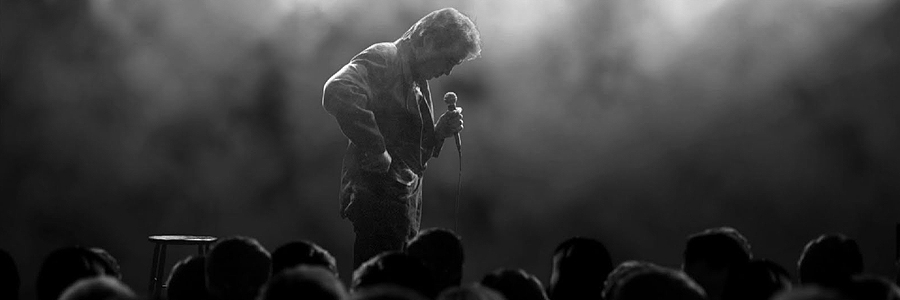
American: The Bill Hicks Story

AMERICAN: THE BILL HICKS STORY (DOCUMENTARY)
American the Movie
Original release: May 14th, 2010
Running time: 102 minutes
Directors: Matt Harlock, Paul Thomas
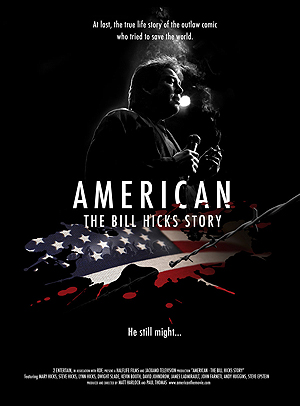
Bill Hicks began his career as a stand-up comic at the age of 15, doing open mic nights in Austin, Texas. Often he had to sneak out of his house at night to bike over to the club he was performing at, knowing his parents would likely disapprove because, if for no other reason, it was a school night. This was the humble beginnings of a long career in comedy, taking him all across the US and Britain. His legacy continues on all these years after his death, and in 2009, a documentary about his life was released.
I’m a big fan of Bill Hicks. Scratch that – I’m a huge fan of Bill Hicks. I can honestly say that, had I not discovered Bill Hicks, I wouldn’t be the person I am today. I was always had of a sense of humour of sorts, but growing up, I was something of a quiet and weird kid. I didn’t care too much for high school, precisely because I was quiet and a bit weird. It wasn’t long after leaving school that I discovered the comedy of Hicks, which had a very profound effect on me. Not only was he funny, but he was outspoken, intelligent and fiercely confident in himself. He started doing stand-up at 15? Christ, I wasn’t comfortable speaking up in class, never mind asking a room full of people to focus on me so I could tell a killer joke. So, naturally I did what most people do when they discover a new thing in their lives… I went out and got everything I could on the guy. I got videos and DVDs and CDs and books. I was utterly hooked. I can still remember my first time listening to Rant In E Minor in my bedroom, laughing hysterically, but also being completely bowled over by the man. Since then, I’ve become a different person. I’m much more comfortable in front of people now. I can talk, joke, lecture and rant. Like I said, without Hicks, I wouldn’t be the person I am today.
Now, given Hicks’ notoriety, it really did seem like only a matter of time before his story found its way onto the big screen. Two British filmmakers, Matt Harlock and Paul Thomas, took the challenge and working with Hicks’ family and friends, the filmmakers gained access to photos and home movies to use alongside the television appearances, gig footage and interviews with people who knew him to tell his story. They even chose to underscore the majority of the picture with the music of Marble Head Johnson, the band Bill formed with friend Kevin Booth. They’ve indeed immersed themselves in the wealth of material available to them.
They also have a very unique and inventive way of constructing the narrative. Taking the interview footage as a basis, they’ve used the photos and images available and animated them together in a very clever and stylish manner, so an anecdote being recounted can become almost an actual scene of conversation between those involved in the story. It’s an animated style that’s similar to the production of South Park, but rendered more realistically, using body doubles and location pictures to build a decent, if clearly animated, sequence. It’s very nice to watch.
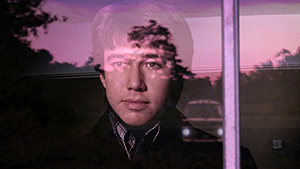
However, despite the inventive visuals, I didn’t particularly care for this film. My problem isn’t exactly a unique one, but it’s one that would get in my way more than someone who was less familiar with Hicks… I know too much about the man already. Since I’ve listened to his routines, read about his life (American Scream by Cynthia True is a superb biography) and watched a Channel 4 special on Hicks’ career, I know much more about the man than this documentary offer. For example, where’s the stuff about his relationship with fellow comedian Sam Kinison, who was a strong personal influence in his life? What about his relationship with his agent, and his agent’s wife? It’s not even just about the omission of significant parts of his life. Things that are mentioned are handled in a very clumsy fashion. What about his legendary love of books and rock music, both of which are only alluded to in clips of his stand-up? Hicks was a huge fan of Hendrix, often using Purple Haze as his intro music. Much like himself, Hendrix was initially ignored in the States, getting a much better reception in Britain before becoming the legend he is now. This point was not lost on Hicks, but it seems to have been lost on the filmmakers. And what about Hick’s fascination with what he always said was his favourite topic of discussion: the Kennedy assassination? This feeds directly into his concern for truth-seeking, which in turn feeds into his interest in Waco. The subject of Waco is addressed, but in an awkward ‘6 Months Earlier’ bit that makes it seem like the film forgot about it and then quickly doubled back.
Also, Hicks’ descent into alcoholism just seems lacking here, so his triumphant return simply feels less triumphant. Even small things are fumbled. Towards the end of the film, Kevin Booth talks about how Hicks wanted to do some final projects before he died, one being a third film in their Ninja Bachelor Party series… I’m sorry, what? A third? Why was there no mention of this project before? Why is it just getting a backhanded reference as things are coming to a close?
In addition to these points, considering the highly influential nature of the man, why are the only discussions with fellow comedians limited to those that he started with? They’re good and interesting, but they don’t exactly give much scope to the piece. Why didn’t they actually speak to Jay Leno? Or Brett Butler? Or Richard Belzer? Why was there no mention of the fact that, so loved was Hicks in the UK, that a 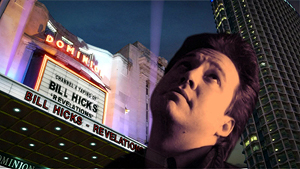 British MP held an early day motion in Parliament commemorating the 10-year anniversary of Hicks’ death? Why not even talk to other comedians who were influenced and inspired by him? Why was there no mention of the controversy between Hicks and Denis Leary? These could perhaps have been included or acknowledged in some way, but clearly this isn’t the story that Harlock and Thomas wanted to tell. The style really did smother the substance.
British MP held an early day motion in Parliament commemorating the 10-year anniversary of Hicks’ death? Why not even talk to other comedians who were influenced and inspired by him? Why was there no mention of the controversy between Hicks and Denis Leary? These could perhaps have been included or acknowledged in some way, but clearly this isn’t the story that Harlock and Thomas wanted to tell. The style really did smother the substance.
I know they can’t tell everything and that some things would have to be overlooked in favour of maintaining focus on the whole story. I’m very much aware that it’s incredibly difficult to tell the full story of someone’s life, deciding what’s important and what’s not. I absolutely understand and appreciate the task at hand. However, American: The Bill Hicks Story just doesn’t stand up as a work of professional documentary. It feels more like a very well produced home movie, something that’s of mild amusement and interest, but ultimately disposable. Sure, if they adopted a more standard approach, it would have been less stylish, but we’d have gotten a better sense of the man at its heart. And isn’t that the point?
I honestly can’t help but feel rather let down by American: The Bill Hicks Story. The visual style of the film is inventive, and it makes good use of the photographs available in a manner that feels fresh. However, the overall direction lacks the real emotional punch and texture that’s needed to tell the story of someone so important and interesting, making it feel much lighter than it should. If you aren’t aware of Hicks’ story, then you may get something from this. For me, all I could see were gaps and omissions and a feeling that someone I greatly respect deserved much better than this.
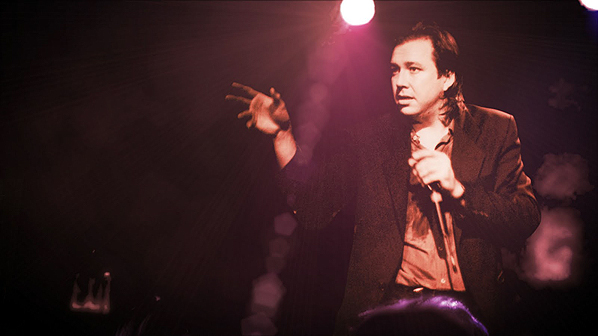

Paul Costello
Paul Costello is a critic, blogger and former film editor with a degree in filmmaking from the University of the West of Scotland. He’s been watching movies for as long as he can remember, and began the process of writing about every movie he owns on his blog: acinephilesjourney.blogspot.co.uk. He’ll be at that for a while. He’s also the resident film writer at TheStreetSavvy.com.
You can follow him on Twitter @PaulCinephile.
© 2022 STATIC MASS EMPORIUM . All Rights Reserved. Powered by METATEMPUS | creative.timeless.personal. | DISCLAIMER, TERMS & CONDITIONS
HOME | ABOUT | CONTACT | TWITTER | GOOGLE+ | FACEBOOK | TUMBLR | YOUTUBE | RSS FEED
CINEMA REVIEWS | BLU-RAY & DVD | THE EMPORIUM | DOCUMENTARIES | WORLD CINEMA | CULT MOVIES | INDIAN CINEMA | EARLY CINEMA
MOVIE CLASSICS | DECONSTRUCTING CINEMA | SOUNDTRACKS | INTERVIEWS | THE DIRECTOR’S CHAIR | JAPANESE CINEMA





